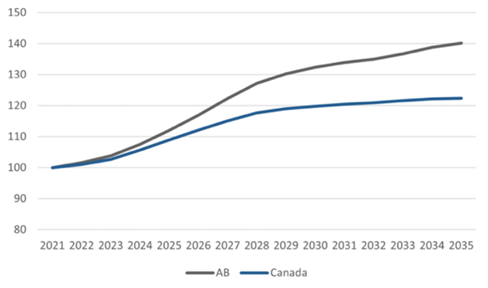The week before last, the Alberta Minister of Advanced Education, Rajan Sawhney announced a funding review for Alberta post-secondary education. I saw a fair bit of snarky comment about this on social media which I thought was kind of unfair. (Note to followers: now that Bluesky actually has passed the minimum viable size to be a useful social media platform, you’ll mostly find me there rather than Twitter. My address is: @alexusherhesa.bsky.social). So, let’s break it down a bit.
The main critique seems to be: another review? And it’s certainly true that Alberta has done a lot of these lately. Of relevance to this file were;
- That enormous Alberta 2030 report done by McKinsey, which touched on a lot of things but not funding (mainly because the government preceded the review by announcing an enormous set of cuts which ended up being about 35% in real terms). You can see my commentary on this review in five separate blog posts from 2020-2021(That Alberta Transformation Contract, How’s the Alberta PSE Re-Think Going, Part 1, How’s the Alberta PSE Re-Think Going, Part 2, That Alberta PSE Strategy (Finally) and Memo to Minister Nicolaides).
- That part of the McKinnon report (backed up by KPMG) which recommended cuts in post-secondary education back in late 2019. This was, empirically speaking, an absolute travesty, as I pointed out back here. But the background here was that the provincial government was downsizing on multiple fronts so there was never a chance that increases in funding were on the table, however much one might have wished more honesty in the presentation of data justifying the cuts.
- One that went under the radar was the Notley government’s funding formula review. This was done without much public fanfare or consultation and was conducted by the consulting firm MNP (transparency note: HESA bid on this project and lost). The results were never released, but the story I have heard is that a) MNP played it straight and offered genuine, evidence-based reforms, and b) that the Minister at the time, Marlin Schmidt, was so horrified at the implications of the report (mainly, huge cuts to rural colleges which by any reasonable standard were over-funded relative to other Alberta institutions) that he threw the report in the trash.
So, yeah, there have been a lot of reviews in Alberta. But a) that’s not a bad thing because reviews—especially public ones—are good, much better than the shoot-from-the-premier’s-office-hip nonsense that increasingly dominates policymaking in other provinces and b) for the first time in a decade, we’re actually talking—maybe—about increasing funding in the sector.
The review is going to be done by a panel not the government itself and not a consulting firm. The membership of the panel has not been named, but the Chair is going to be well-known (conservative) University of Calgary economist Jack Mintz. Now, Mintz (how can I put this?) tends to provoke strong opinions. And some on the left—hell, even some on the right—might view his nomination as a provocation.
I’m not so sure, though. Mintz is an academic and thus (unlike KPMG and McKinsey) has some insider views of how the system is supposed to work. That’s got to be a plus. Much, of course, may depend on who the other panellists are (all, apparently, will be individuals with “experience in Alberta’s publicly funded post-secondary system”) and whether or not the panel chooses to base its conclusions on data from unreliable sources like some previous reviews have done. But my instinct here is to give the panel the benefit of the doubt: it looks like the best chance for positive change on funding in about a decade.
If you’re going to look for sources of concern, I would focus more on the mandate of the panel, which is to provide recommendations on the following four areas:
- current and alternative funding mechanisms,
- impacts of federal immigration policies on Alberta’s post-secondary institutions (PSIs),
- the cost of the administrative and regulatory burden on PSIs, and
- the overall competitiveness of Alberta’s higher education system.
I don’t think there’s anything wrong with any of these, but holy cow, does it miss the elephant in the room in Alberta post-secondary education, to wit, Figure 1.
Figure 1: Population Age 18-21 (2021 = 100), Canada vs. Alberta, 2021-2025

Alberta is in the midst of what is—bar none—the biggest youth population explosion in the past 50 years. We are looking at a 40% increase in the size of the traditional post-secondary population—and demand is likely to increase even more because so much of the population growth is due to immigration and the children of immigrants are much more likely to want post-secondary education than the children of 2nd and 3rd-generation Canadians. In short, there is an urgent need to expand the capacity of post-secondary education in the province. This challenge should be top of the list of challenges: how it didn’t crack the top four is an utter mystery. One hopes it is an area the panel itself can choose to focus its attention.
In any event: the UCP’s record on post-secondary education may have been a disappointment so far, but this panel represents a chance for the government to redeem itself. Nothing is certain, obviously, but the right panel members and a slightly better terms of reference, there is a reasonable chance this might be quite a useful exercise.
Fingers crossed, anyway.

 Tweet this post
Tweet this post

Reviews are many things, but one of them is an occasion for existential crisis. Maybe one of the reasons that everyone on social media might seem tired of them is that it’s hard to think deep thoughts about (say) Tolstoy’s _War and Peace_, while worrying that all the Russian courses might go the way of Moscow in 1812.
Constantly questioning what we do detracts from actually doing it. Reviews, like administration generally, should therefore be minimized.